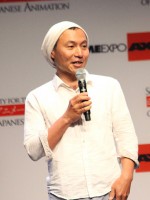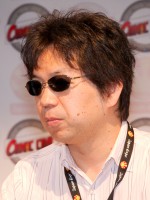Yōko Kanno is a Sound Japonaise born on 18 march 1963

Yoko Kanno (菅野 よう子, Kanno Yōko, born March 18) is a composer, arranger and musician best known for her work on the soundtracks for many anime films, television series, live-action films, video games, and advertisements. She was born in Sendai, Miyagi Prefecture, Japan. She has written scores for famous animated works, including Darker than Black, Macross Plus, Turn A Gundam, Cowboy Bebop, The Vision of Escaflowne, Ghost in the Shell: Stand Alone Complex, Wolf's Rain, Sakamichi no Apollon, and is the most trusted composer by veteran and new-wave directors such as Yoshiyuki Tomino, Shinichiro Watanabe and Shoji Kawamori. Kanno has also composed music for pop artists, the most notable being Maaya Sakamoto and Kyōko Koizumi. She is also a skilled keyboardist, and is the frontwoman for the Seatbelts, who perform many of Kanno's compositions on the various original soundtracks for which she is responsible.
Some of Yoko Kanno's most famous soundtrack themes include "Kiseki no Umi" (Lodoss War), "Voices" (Macross Plus), "Tank!" (Cowboy Bebop), "Yakusoku wa Iranai" (Escaflowne), "Gravity" (Wolf's Rain), "Inner Universe" (Ghost in the Shell: Stand Alone Complex) and Stand Alone Complex O.S.T. In regards to making the Stand Alone Complex soundtrack she said:
I had this image of a formal and rigid 'manly' world for the original comic. So I tried to think of ways to destroy that world. The theme I had in mind was, 'be human.' It represented the sentiment of 'why don't we take it easy and be more like a human being?'—instead of being a workaholic salaried man working for his company. Or be it Tachikoma wishing to become human. I wanted to express these 'tangible fuzziness,' sort of. For the opening theme song called 'inner universe,' I had an image of digital bits and composed a score consisting of recurrent quick beats.
Having composed in various genres, including blues, classical, jazz, techno, and J-pop, she was once asked if she favored a particular genre:
Ah ... I hear everyone talk about how many genres [I work in] like classical, jazz and others, but personally, I don't divide music by genre when creating. I don't create by saying, 'I must create a classical piece here,' or 'I must create a jazz piece here.' When I create music, I don't consider at all which genre I like best, but what the scene or the anime calls for, like a love [theme] or a mood. There isn't one genre I like more than the others. I find all of them satisfying and all inspire me in different ways.
Since she works in the animation industry, she only receives instructions and storyboards from directors which helps her with composing. However, it is uncertain if all of her works are to be included in the finished project. She once said that this is a way she likes to work, for she does not have to deal with rules during composing. In reference to this, she once stated:
In my case, the creators talk to me and ask me to do a soundtrack a year or two before the animation is finished. At that time, I think of the plot in my brain, when the characters' names—everything about the characters—has not been decided yet. This is even when the title has not be decided yet.
She was the lead member of the project band called Seatbelts, which regrouped in the year of 2004 to compose the soundtrack of the PlayStation 2 Cowboy Bebop video game, released in Japan in 2005.
She has composed for many Koei games released during the late 1980s to early 1990s and for Napple Tale, a Dreamcast game. Due to her close involvement in the Cowboy Bebop anime, the game released by Bandai also features her work.
Apart from anime and games, Kanno also composes for live-action films and television commercials. Some popular brands she has composed for are Canon, DoCoMo, Fuji Xerox, Seven-Eleven, Microsoft, Nissan, Toyota, Shiseido, Avon, and Master Card to name a few. Grand Funk Inc. is her recording studio of choice in producing for these two media. Contributions to films started in the 90s but only since 2002 has there been a trend towards the medium. Most of the latter were shown in international film festivals.
She has attended Otakon and Anime Expo in 1999, as well as Anime Expo New York in 2002. In 2010, she made a surprise appearance at Anime Expo. Yoko Kanno performed her solo PianoMe concert at Otakon 2013.
Personal life
In addition to Japanese, she speaks very little English and some French, but claims that her English is "poor" and she needs translation help to converse in French. In regards to spirituality and religion, she said:
I'm not religious at all. But Japanese don't believe in one God, but in gods everywhere in plants and animals. That's right. In Japan, Christianity has a wonderful image. People enjoy the image of Christ and Christianity in picture books, but not as a religion.
Besides music, Kanno also enjoys photography and writing. She has written a number of journals for Newtype magazine of which photos for illustrations are done by Kanno herself as well, and a selection of photos taken by Kanno of her protégé and former production partner Maaya Sakamoto were featured in the special event program for Sakamoto's 2010 thirtieth birthday concert at Nippon Budokan.
In 2011, Kanno expressed her support and wishes to the victims of the 2011 Tōhoku earthquake and tsunami, composing a song titled "Kimi de Ite, Buji de Ite". Later, she composed NHK's official support song on the occasion of the first anniversary of the earthquake entitled "Hana wa Saku" ("Flowers Will Bloom") featuring lyrics by Sendai film director Shunji Iwai. The song features notable natives from the affected areas of Fukushima, Miyagi, and Iwate.
Source : Wikidata
Yōko Kanno

Biography
Professional lifeSome of Yoko Kanno's most famous soundtrack themes include "Kiseki no Umi" (Lodoss War), "Voices" (Macross Plus), "Tank!" (Cowboy Bebop), "Yakusoku wa Iranai" (Escaflowne), "Gravity" (Wolf's Rain), "Inner Universe" (Ghost in the Shell: Stand Alone Complex) and Stand Alone Complex O.S.T. In regards to making the Stand Alone Complex soundtrack she said:
I had this image of a formal and rigid 'manly' world for the original comic. So I tried to think of ways to destroy that world. The theme I had in mind was, 'be human.' It represented the sentiment of 'why don't we take it easy and be more like a human being?'—instead of being a workaholic salaried man working for his company. Or be it Tachikoma wishing to become human. I wanted to express these 'tangible fuzziness,' sort of. For the opening theme song called 'inner universe,' I had an image of digital bits and composed a score consisting of recurrent quick beats.
Having composed in various genres, including blues, classical, jazz, techno, and J-pop, she was once asked if she favored a particular genre:
Ah ... I hear everyone talk about how many genres [I work in] like classical, jazz and others, but personally, I don't divide music by genre when creating. I don't create by saying, 'I must create a classical piece here,' or 'I must create a jazz piece here.' When I create music, I don't consider at all which genre I like best, but what the scene or the anime calls for, like a love [theme] or a mood. There isn't one genre I like more than the others. I find all of them satisfying and all inspire me in different ways.
Since she works in the animation industry, she only receives instructions and storyboards from directors which helps her with composing. However, it is uncertain if all of her works are to be included in the finished project. She once said that this is a way she likes to work, for she does not have to deal with rules during composing. In reference to this, she once stated:
In my case, the creators talk to me and ask me to do a soundtrack a year or two before the animation is finished. At that time, I think of the plot in my brain, when the characters' names—everything about the characters—has not been decided yet. This is even when the title has not be decided yet.
She was the lead member of the project band called Seatbelts, which regrouped in the year of 2004 to compose the soundtrack of the PlayStation 2 Cowboy Bebop video game, released in Japan in 2005.
She has composed for many Koei games released during the late 1980s to early 1990s and for Napple Tale, a Dreamcast game. Due to her close involvement in the Cowboy Bebop anime, the game released by Bandai also features her work.
Apart from anime and games, Kanno also composes for live-action films and television commercials. Some popular brands she has composed for are Canon, DoCoMo, Fuji Xerox, Seven-Eleven, Microsoft, Nissan, Toyota, Shiseido, Avon, and Master Card to name a few. Grand Funk Inc. is her recording studio of choice in producing for these two media. Contributions to films started in the 90s but only since 2002 has there been a trend towards the medium. Most of the latter were shown in international film festivals.
She has attended Otakon and Anime Expo in 1999, as well as Anime Expo New York in 2002. In 2010, she made a surprise appearance at Anime Expo. Yoko Kanno performed her solo PianoMe concert at Otakon 2013.
Personal life
In addition to Japanese, she speaks very little English and some French, but claims that her English is "poor" and she needs translation help to converse in French. In regards to spirituality and religion, she said:
I'm not religious at all. But Japanese don't believe in one God, but in gods everywhere in plants and animals. That's right. In Japan, Christianity has a wonderful image. People enjoy the image of Christ and Christianity in picture books, but not as a religion.
Besides music, Kanno also enjoys photography and writing. She has written a number of journals for Newtype magazine of which photos for illustrations are done by Kanno herself as well, and a selection of photos taken by Kanno of her protégé and former production partner Maaya Sakamoto were featured in the special event program for Sakamoto's 2010 thirtieth birthday concert at Nippon Budokan.
In 2011, Kanno expressed her support and wishes to the victims of the 2011 Tōhoku earthquake and tsunami, composing a song titled "Kimi de Ite, Buji de Ite". Later, she composed NHK's official support song on the occasion of the first anniversary of the earthquake entitled "Hana wa Saku" ("Flowers Will Bloom") featuring lyrics by Sendai film director Shunji Iwai. The song features notable natives from the affected areas of Fukushima, Miyagi, and Iwate.
Usually with
Filmography of Yōko Kanno (15 films)
Sound

Our Little Sister (2015)
, 2h6Directed by Hirokazu Kore-eda
Origin Japon
Genres Drama, Comedy
Themes Seafaring films, Transport films
Actors Haruka Ayase, Masami Nagasawa, Kaho, Suzu Hirose, Shinichi Tsutsumi, Ryō Kase
Roles Original Music Composer
Rating75%





Le film raconte l'histoire de trois sœurs d'une vingtaine d'années qui vivent ensemble à Kamakura et qui, après la mort de leur père, décident de renoncer à son héritage mais de recueillir leur demi-sœur âgée de 14 ans pour vivre avec elle dans la maison familiale. Le film étudie les relations qui se créent entre les trois soeurs ainées et la "petite soeur".
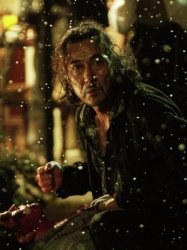
The World of Kanako (2014)
, 1h58Directed by Tetsuya Nakashima
Genres Drama, Thriller, Horror, Crime
Actors Kōji Yakusho, Satoshi Tsumabuki, Joe Odagiri, Nana Komatsu, Fumi Nikaidō, Ai Hashimoto
Roles Original Music Composer
Rating64%





A former detective, Akihiro Fujishima (Kōji Yakusho), tries to search for his daughter Kanako (Nana Komatsu), who has been missing for a few days, and learns about his daughter's secret life.
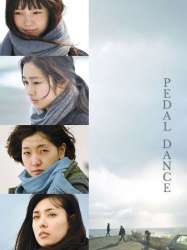
Petal Dance (2013)
, 1h30Genres Drama
Actors Aoi Miyazaki, Sakura Andō, Kazue Fukiishi, Shiori Kutsuna, Masanobu Ando, Shunsuke Kazama
Roles Music
Rating66%





The film concerns a trip taken by two women, Jinko (Aoi Miyazaki) and Motoko (Sakura Ando), and their driver, Haraki (Shiori Kutsuna), to see Miki (Kazue Fukiishi), an old friend now living in a psychiatric hospital after attempting suicide. Jinko and Motoko have not seen Miki in six years, and the trip becomes a meditation on their own lives and sorrows, as well as reconciliation for their guilt of not being able to help her before.
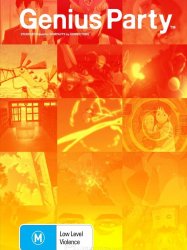
Genius Party (2007)
, 1h25Directed by Kōji Morimoto, Shin'ichirō Watanabe, Kazuto Nakazawa, Shōji Kawamori, Mahiro Maeda, Masaaki Yuasa
Genres Science fiction, Animation
Actors Rinko Kikuchi, Yūya Yagira
Roles Original Music Composer
Rating68%





 , 1h45
, 1h45Directed by Kenji Kamiyama
Origin Japon
Genres Science fiction, Thriller, Action, Crime, Animation
Themes Films about computing, Films set in the future, Political films, Cyberpunk films, Dystopian films
Actors Atsuko Tanaka, Akio Ōtsuka, Kōichi Yamadera, Osamu Saka, Yutaka Nakano, Tōru Ōkawa
Roles Music
Rating77%





In 2034, two years after the events of 2nd GIG, Public Security Section 9 is investigating a string of mysterious suicides by refugees from the Siak Republic. Chief Aramaki conducts a raid to arrest the refugee dictator only to find him already dead. In retaliation, a Siak operative plans a terrorist attack with a micromachine virus. Batou is sent to intercept the Siak operative and encounters Kusanagi, who is conducting her own investigation. Before they can apprehend the operative, he dies while attacking them. Kusanagi takes a case of virus ampules and warns Batou to stay away from the Solid State Society before leaving.
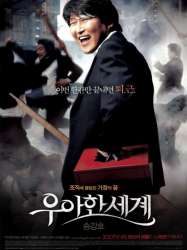
The Show Must Go On (2007)
, 1h52Directed by Han Jae-rim
Genres Drama, Comedy, Action, Crime
Actors Song Kang-ho, Oh Dal-soo, Yoon Je-moon, Choi Il-hwa, Choi Il-hwa, Oh Jung-se
Roles Original Music Composer
Rating66%





In-gu is a gangster but also a husband and father who dreams of moving his family out of their drab apartment and into a bigger home. Shunned by his daughter and nagged by his wife to get a respectable job, In-gu nonetheless perseveres down his chosen path to provide for his family. But his family life starts to get in the way of his business, and to make matters worse he is plotted against by the younger brother of his boss which favors In-gu for his abilities to enforce territorial rights.

Su-ki-da (2006)
, 1h44Genres Drama, Romance
Actors Hidetoshi Nishijima, Hiromi Nagasaku, Eita, Aoi Miyazaki, Ryō Kase, Sayuri Oyamada
Roles Music
Rating69%





High school student Yosuke spends most of his free time sitting near a floodgate and playing the same short tune on his acoustic guitar. He is often joined by a girl in his class, Yu. Yu hums Yosuke's tune to her older sister, who is mourning her deceased boyfriend. Yu sets up a few meetings between Yosuke and her sister. While talking with Yosuke after school, Yu kisses him, but Yosuke walks away, leaving Yu devastated. While walking to see Yosuke, Yu's sister is hit by a truck and enters a coma. Yu tells Yosuke that she wants to hear his song when he finishes it.
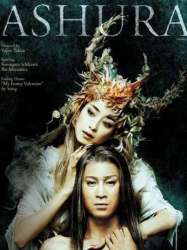
Ashura (2005)
, 1h59Directed by Yōjirō Takita
Genres Science fiction, Fantasy, Action, Horror
Themes Seafaring films, Sports films, Transport films, Martial arts films
Actors Rie Miyazawa, Kanako Higuchi, Erika Sawajiri, Fumiyo Kohinata, Takashi Naitō, Yukijirō Hotaru
Roles Original Music Composer
Rating57%





Dans le Japon de l'ère Edo, alors que la lutte entre démons et samouraïs fait rage, on annonce la résurrection de la toute-puissante Ashura, Reine de tous les démons. Au même moment, Izumo, un ancien chasseur de démons reconverti dans le théâtre, fait la connaissance d'une mystérieuse jeune femme dont il tombe rapidement amoureux. Mais sa rencontre avec celle-ci, qui semble être étrangement liée à la maléfique Ashura, le confronte violemment à son passé. Son amour pour la jeune femme mènera Izumo vers un ultime combat.

Mind Game (2004)
, 1h43Directed by Masaaki Yuasa
Origin Japon
Genres Drama, Comedy, Fantasy, Adventure, Animation, Romance
Themes Films about animals, Seafaring films, Films about religion, Transport films, Time travel films, Cétacé, Mise en scène d'un cétacé
Actors Kōji Morimoto, Tomomitsu Yamaguchi, Shin'ichirō Watanabe, Rintarō Nishi
Roles Musician
Rating76%





Nishi is a 20-year-old loser with dreams of becoming a comic book artist. One late evening he runs into his childhood crush, Myon, on the subway. Nishi declares he has always loved her, but she tells him she is due to marry someone else.

Tokyo.sora (2002)
, 2h7Genres Drama
Actors Igawa Haruka, Hidetoshi Nishijima, Teruyuki Kagawa, Endo Shozo (遠藤章造)
Roles Music
Rating69%





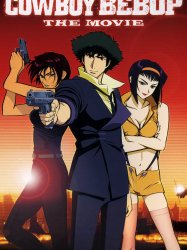
Cowboy Bebop: The Movie (2001)
, 1h55Directed by Tensai Okamura, Shin'ichirō Watanabe, Hiroyuki Okiura
Origin Japon
Genres Science fiction, Comedy, Action, Animation, Western
Themes Space adventure films, Medical-themed films, Sports films, Films about terrorism, Mars in film, Films set in the future, Martial arts films, Films about viral outbreaks, Films about psychiatry, Films about disabilities, Space opera
Actors Kōichi Yamadera, Unshō Ishizuka, Steven Blum, Aoi Tada, Wendee Lee, Megumi Hayashibara
Roles Original Music Composer
Rating77%





Cowboy Bebop: The Movie is set on Mars in the year 2071, forty-nine years after Earth was mostly abandoned after a catastrophe. Humanity has settled on other planets and moons in the solar system. The film's protagonists are legalized bounty hunters who travel together on the spaceship Bebop. They are Spike Spiegel, a former associate of the Red Dragon crime syndicate; Jet Black, a former police officer and owner of the Bebop; Faye Valentine, a woman who was once a fugitive from bounty hunters; Edward Wong (Ed for short), a girl with genius computer skills; and Ein, an artificial dog with human level intelligence.
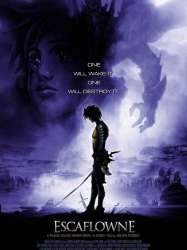
Escaflowne (2000)
, 1h38Directed by Kazuki Akane
Genres Fantastic, Fantasy, Action, Adventure, Animation
Actors Māya Sakamoto, Tomokazu Seki, Kelly Sheridan, Jouji Nakata, Mayumi Iizuka, Minami Takayama
Rating65%





Hitomi Kanzaki is plagued by sleepiness and experiences very unusual and strange dreams. She is depressed and wants nothing more than to disappear. After leaving her only friend, she is suddenly transported, while inside the Dragon Armour, to a new and mysterious world, Gaea. Once there she is declared the "Winged Goddess", but is confused and can't understand anything. After a while she discovers there is a battle for the Black Dragons dynasty between Prince Van and his brother Lord Folken. A battle in which she is called to play an important role.
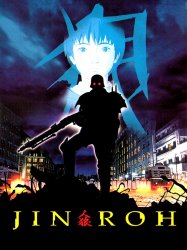
Jin-Roh: The Wolf Brigade (1999)
, 1h42Directed by Hiroyuki Okiura
Genres Drama, Science fiction, Thriller, Fantasy, Action, Animation, Romance
Themes Films about animals, Seafaring films, Transport films, Wolves in film, Dystopian films, Alternate history films, Mise en scène d'un mammifère
Actors Yoshikatsu Fujiki, Hiroyuki Kinoshita, Eri Sendai, Yoshisada Sakaguchi, Tamio Ōki
Roles Musician
Rating73%





The story is set in a parallel 1950s Japan, in which Germany has conquered Japan. It focuses on Kazuki Fuse, a member of the elite Kerberos Panzer Cops, a metropolitan antiterror unit. Fuse confronts his own humanity when he fails to shoot a young female terrorist. The girl detonates a bomb in front of him, only killing herself. The incident damages the reputation of the unit and Kazuki is punished. He visits the ashes of the dead girl and meets Kei Amemiya, who claims to be the elder sister of the victim. They develop a relationship. Kei is eventually revealed to not be the suicide bomber's sister but instead a former bomb courier and a honey trap acting on behalf of the Special Unit's rival division Public Security.

Noiseman Sound Insect (1997)
, 16minutesDirected by Kōji Morimoto
Genres Science fiction, Fantasy, Animation
Actors Hideki Ogihara, Maya Okamoto, Daisuke Sakaguchi, Gorō Naya, Kappei Yamaguchi, Etsuko Kozakura
Roles Original Music Composer
Rating69%





Dans une cité aux allures futuristes, une créature jaillit de l'esprit malade d'un scientifique, Noiseman. Pour se nourrir des graines de bruit, il prend le contrôle de l'humanité et tente d'éradiquer toutes formes de musique. Un jour, Tobio, jeune chasseur à la solde de Noiseman, tombe par inadvertance dans la mer bleue, repaire de l'ennemi et retrouve la mémoire. Il est dès lors capturé et séparé de son cristal, il devient la cible de ses anciens amis. C'est sans compter l'aide de Leina, son amie d'enfance, qui fera tout pour lui rendre son précieux bien.
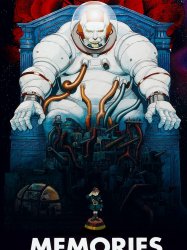
Memories (1995)
, 1h53Directed by Kōji Morimoto, Tensai Okamura, Katsuhiro Ōtomo
Origin Japon
Genres Science fiction, Fantasy, Action, Adventure, Animation
Themes Seafaring films, Transport films
Actors Hideyuki Hori, Hisao Egawa, Shigeru Chiba, Tsutomu Isobe, Michio Hazama, Kenichi Ogata
Roles Original Music Composer
Rating74%





The Corona, a deep space salvage freighter, is out on a mission when it encounters a distress signal and responds to it. They come upon a spaceship graveyard orbiting a giant space station. The crew's two engineers, Heintz and Miguel, enter it to get a closer look.
 Connection
Connection

